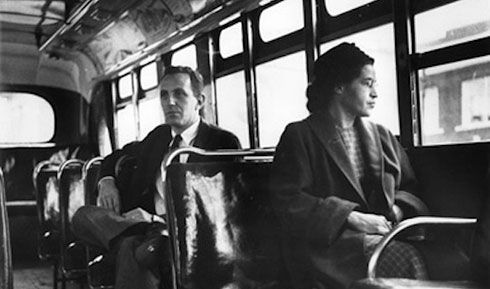
Whenever I walk up to the elevators in my building, sometimes there is an elevator waiting open, and sometimes I have to push the button to call for one. Regardless of whichever of those is the case, I can fairly easily say that it’s with a majority consistency; the very last elevators in the back of the corridor are the ones I end up having to ride. I like to call those last two elevators the Rosa Parks elevators; because they’re all the way in the back.
In honor of black history month, it’s time for yet another danny is a racist post, poking fun at double standards and ironic inequality.
The other day, I was the front car sitting at a red light intersection. I watched as a line of school buses chugged along through the intersection, packed to the gills with children. Now I don’t hide the fact that I live in a very predominantly black area; shit, I live in Atlanta, which is like 60% African-American. So I’m watching these buses, and much like the aforementioned demographic, pretty much every single window-seated face, including the drivers of all these buses was African-American. Anyone who wasn’t black stood out like a sore thumb.
But then I noticed something. Four of the six buses that made it through the busy intersection actually had at least one kid that wasn’t black, sitting at a window seat. And do you want to know where they were seated? In three of those four buses, the non-black person at the window, was seated at the back of the bus. Obviously, I’ll give benefit of the doubt that such was probably just a coincidence, but it doesn’t change the fact that it’s no less ironically hilarious that it turned out in such a way.
Regardless, it’s funny to think about what the symbolism of the back of the bus has turned into, since the days of Rosa Parks. In 1955, the back of the bus was essentially a symbol of denigration, where people of color had to sit. They could ride the bus, but only under the condition that they had to sit in the part of the bus where the white folk didn’t want to sit at, exclusively. As a metaphor, it meant last in priority, essentially; most definitely a pejorative in general.
I think back to when I was in elementary school and riding the bus, the back of the bus was where all the kids wanted to go. It sucked for me, because my bus stop was always on the tail ends of the routes, and my teachers never let us out before the other kids. It was obviously the optimum position to be out of sight of the view of the meddling bus driver, so that rules could be broken, cuss words can be said, and in today’s apparent society, lots of juvenile oral sex happens.
But the comparison isn’t exclusive to buses either though. Somewhere in time, the back of the bus metaphor turned from a place of denigration, to a place of preference. Whether it’s a bus, a classroom, conference room, or the big ass lobby where we have to wait in when we’re called into jury duty, when people are given the opportunity to pick where they want to sit, so often times I notice that people tend to get to the back of the available seats first.
Except on airplanes, nobody wants to be on the back of an airplane, because it takes fucking forever for people to file out of them.
But the point remains that somewhere in history, the back of the anything stopped being derogatory, and became preferential. But regardless of the vanished taboo behind sitting in the back, it’s still funny in an ironic sense to those that remember the story behind Rosa Parks and what it used to symbolize.
